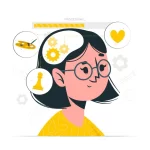Definition of Perception
Perception refers to the process by which individuals interpret and make sense of sensory information received from the environment. It involves the organization, interpretation, and understanding of sensory inputs such as sight, sound, touch, taste, and smell. Perception is influenced by various factors including past experiences, cultural background, expectations, beliefs, and emotions. It plays a crucial role in how individuals perceive and interact with the world around them, shaping their thoughts, beliefs, and behaviors.

Explanation of Perception
Perception is the mental process through which individuals interpret and understand the sensory information they receive from their surroundings. It involves gathering data through the senses – sight, hearing, touch, taste, and smell – and then organizing, interpreting, and making sense of that information.
Here’s a breakdown of how perception works:
- Sensory Input: Perception begins with the reception of sensory stimuli from the environment. This includes everything we see, hear, touch, taste, and smell.
- Sensory Processing: The sensory information is then transmitted to the brain through sensory organs such as the eyes, ears, skin, tongue, and nose. Each sensory organ processes specific types of stimuli.
- Perceptual Organization: Once the sensory information reaches the brain, it is organized and integrated. The brain combines individual sensory inputs into coherent perceptions of objects, events, and experiences. This process involves grouping elements based on proximity, similarity, continuity, closure, and other principles of perceptual organization.
- Interpretation: The brain interprets the organized sensory information based on various factors such as past experiences, expectations, beliefs, cultural background, and emotional state. These factors influence how individuals perceive and understand the world around them.
- Perceptual Constancy: Perception involves maintaining a stable understanding of objects and environments despite changes in sensory input. For example, even when an object changes in size or shape due to distance or angle, we perceive it as the same object.
- Perceptual Errors: Despite its efficiency, perception is prone to errors and biases. Factors such as selective attention, perceptual set, and context can influence how we perceive stimuli, leading to inaccuracies or distortions in our perception of reality.
Overall, perception is a dynamic and complex process that allows individuals to make sense of the world and navigate their environment effectively. It forms the basis of our sensory experiences, thoughts, beliefs, and behaviors.
Perception and psychology
Perception is a fundamental concept in psychology that plays a central role in various areas of study, including cognitive psychology, social psychology, developmental psychology, and clinical psychology. Here’s how perception intersects with psychology:
- Cognitive Psychology: Cognitive psychologists study mental processes such as perception, memory, attention, and reasoning. Perception is a key focus within cognitive psychology as it involves how individuals acquire, interpret, and organize sensory information. Researchers investigate topics such as perceptual organization, pattern recognition, depth perception, and the role of attention in shaping perception.
- Social Psychology: Perception influences social interactions and interpersonal relationships. Social psychologists examine how individuals perceive others, form impressions, make attributions, and interpret social cues. Topics such as person perception, stereotyping, prejudice, and social influence all involve the role of perception in understanding social phenomena.
- Developmental Psychology: Perception undergoes significant development across the lifespan, from infancy through old age. Developmental psychologists study how perceptual abilities emerge and change over time, examining factors such as perceptual learning, sensory-motor development, and the impact of experience on perception. Understanding perceptual development provides insights into cognitive development more broadly.
- Clinical Psychology: Perception can be affected by psychological disorders and mental health conditions. Clinical psychologists assess and treat individuals with perceptual disturbances, such as hallucinations, illusions, and distorted perceptions of reality. Perception also plays a role in psychological assessments and diagnostic procedures.
- Perception and Behavior: Perception influences behavior in numerous ways. For example, how individuals perceive risks and rewards can impact decision-making and behavior. Perceptual biases and heuristics can lead to errors in judgment and decision-making. Understanding how perception shapes behavior is essential for understanding human cognition and behavior in various contexts.
Overall, perception is a multifaceted phenomenon that is central to understanding the workings of the mind and behavior. Its study within psychology provides insights into how individuals perceive, interpret, and respond to the world around them, contributing to our understanding of human cognition, social interaction, development, and mental health.










